An Analysis of Psychological Theories in Fundamentals of Education
VerifiedAdded on 2023/01/03
|11
|2552
|56
Report
AI Summary
This report provides a detailed overview of various psychological theories relevant to education. It begins with an introduction to the fundamentals of education and then delves into several key theories. The report discusses Cognitive Development Theory, Multiple Intelligence Theory, Informati...
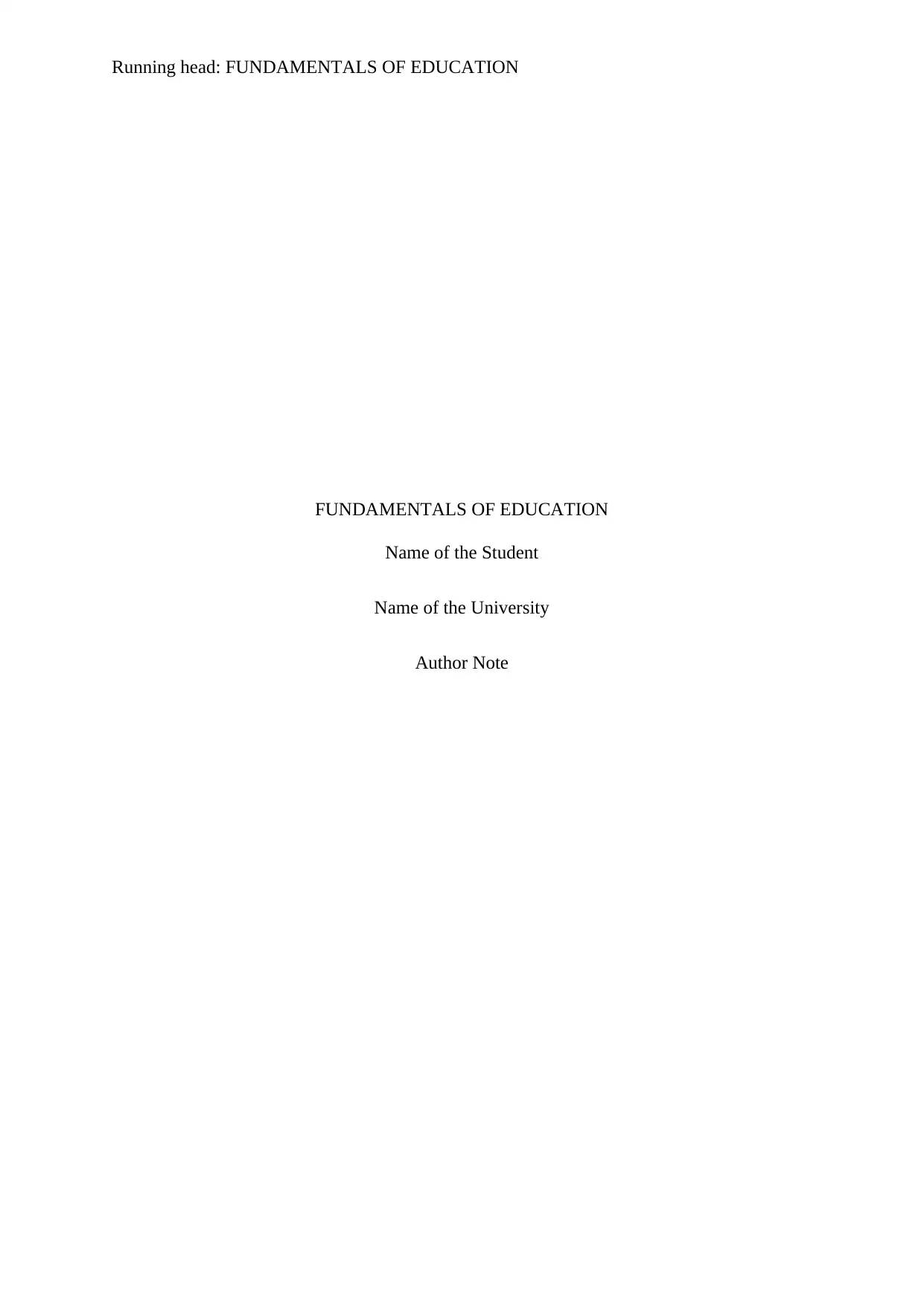
Running head: FUNDAMENTALS OF EDUCATION
FUNDAMENTALS OF EDUCATION
Name of the Student
Name of the University
Author Note
FUNDAMENTALS OF EDUCATION
Name of the Student
Name of the University
Author Note
Paraphrase This Document
Need a fresh take? Get an instant paraphrase of this document with our AI Paraphraser
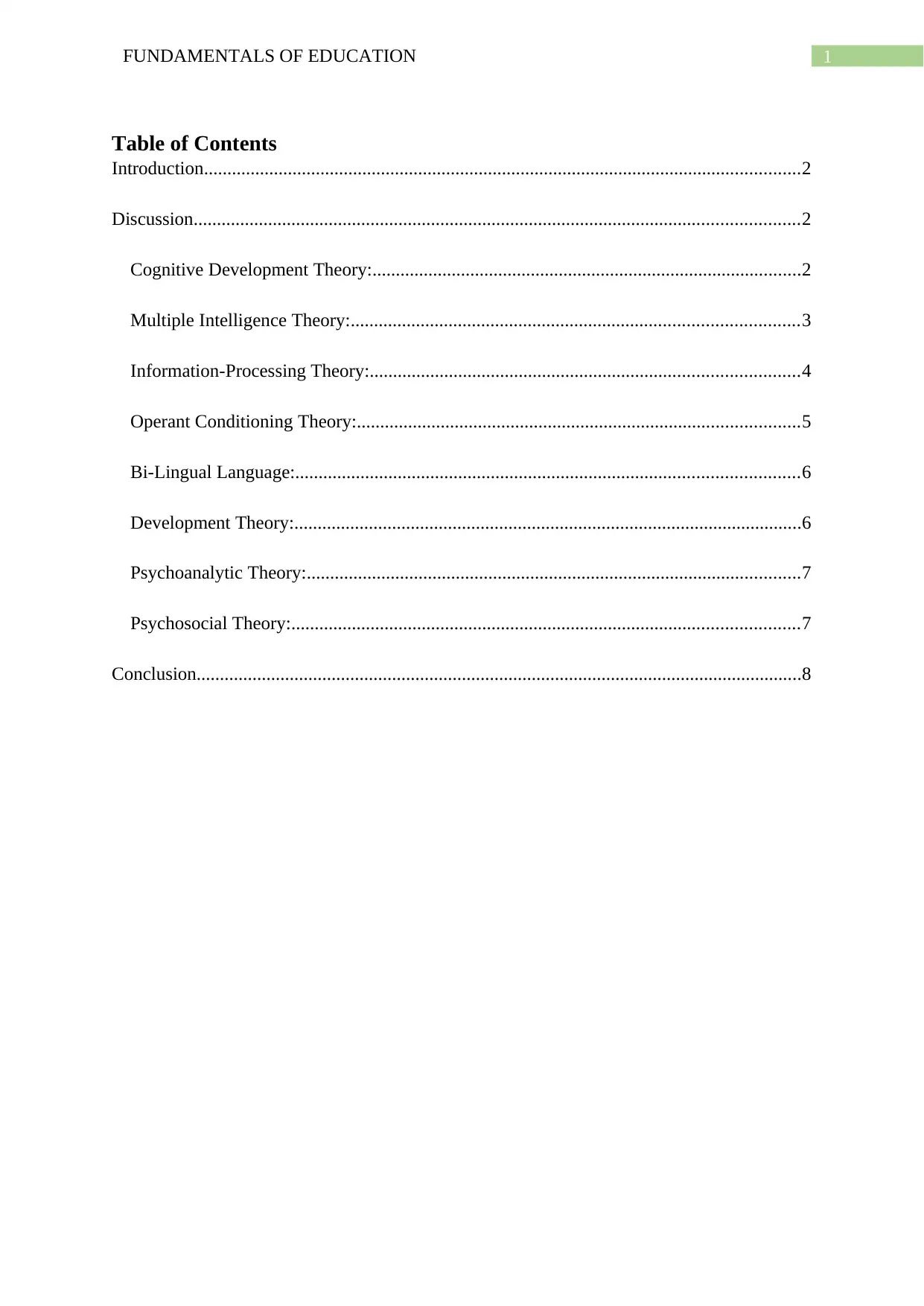
1FUNDAMENTALS OF EDUCATION
Table of Contents
Introduction................................................................................................................................2
Discussion..................................................................................................................................2
Cognitive Development Theory:............................................................................................2
Multiple Intelligence Theory:................................................................................................3
Information-Processing Theory:............................................................................................4
Operant Conditioning Theory:...............................................................................................5
Bi-Lingual Language:............................................................................................................6
Development Theory:.............................................................................................................6
Psychoanalytic Theory:..........................................................................................................7
Psychosocial Theory:.............................................................................................................7
Conclusion..................................................................................................................................8
Table of Contents
Introduction................................................................................................................................2
Discussion..................................................................................................................................2
Cognitive Development Theory:............................................................................................2
Multiple Intelligence Theory:................................................................................................3
Information-Processing Theory:............................................................................................4
Operant Conditioning Theory:...............................................................................................5
Bi-Lingual Language:............................................................................................................6
Development Theory:.............................................................................................................6
Psychoanalytic Theory:..........................................................................................................7
Psychosocial Theory:.............................................................................................................7
Conclusion..................................................................................................................................8
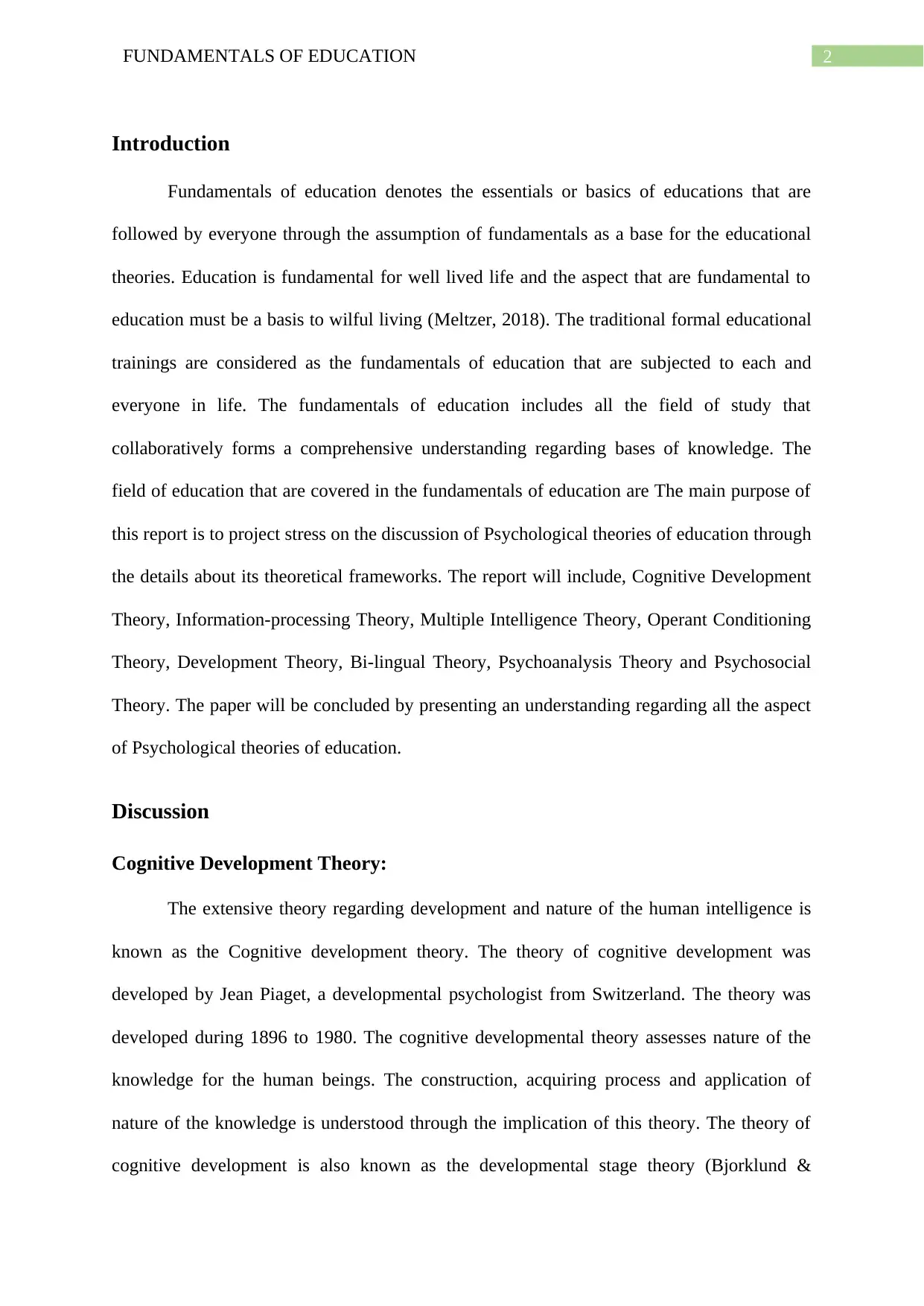
2FUNDAMENTALS OF EDUCATION
Introduction
Fundamentals of education denotes the essentials or basics of educations that are
followed by everyone through the assumption of fundamentals as a base for the educational
theories. Education is fundamental for well lived life and the aspect that are fundamental to
education must be a basis to wilful living (Meltzer, 2018). The traditional formal educational
trainings are considered as the fundamentals of education that are subjected to each and
everyone in life. The fundamentals of education includes all the field of study that
collaboratively forms a comprehensive understanding regarding bases of knowledge. The
field of education that are covered in the fundamentals of education are The main purpose of
this report is to project stress on the discussion of Psychological theories of education through
the details about its theoretical frameworks. The report will include, Cognitive Development
Theory, Information-processing Theory, Multiple Intelligence Theory, Operant Conditioning
Theory, Development Theory, Bi-lingual Theory, Psychoanalysis Theory and Psychosocial
Theory. The paper will be concluded by presenting an understanding regarding all the aspect
of Psychological theories of education.
Discussion
Cognitive Development Theory:
The extensive theory regarding development and nature of the human intelligence is
known as the Cognitive development theory. The theory of cognitive development was
developed by Jean Piaget, a developmental psychologist from Switzerland. The theory was
developed during 1896 to 1980. The cognitive developmental theory assesses nature of the
knowledge for the human beings. The construction, acquiring process and application of
nature of the knowledge is understood through the implication of this theory. The theory of
cognitive development is also known as the developmental stage theory (Bjorklund &
Introduction
Fundamentals of education denotes the essentials or basics of educations that are
followed by everyone through the assumption of fundamentals as a base for the educational
theories. Education is fundamental for well lived life and the aspect that are fundamental to
education must be a basis to wilful living (Meltzer, 2018). The traditional formal educational
trainings are considered as the fundamentals of education that are subjected to each and
everyone in life. The fundamentals of education includes all the field of study that
collaboratively forms a comprehensive understanding regarding bases of knowledge. The
field of education that are covered in the fundamentals of education are The main purpose of
this report is to project stress on the discussion of Psychological theories of education through
the details about its theoretical frameworks. The report will include, Cognitive Development
Theory, Information-processing Theory, Multiple Intelligence Theory, Operant Conditioning
Theory, Development Theory, Bi-lingual Theory, Psychoanalysis Theory and Psychosocial
Theory. The paper will be concluded by presenting an understanding regarding all the aspect
of Psychological theories of education.
Discussion
Cognitive Development Theory:
The extensive theory regarding development and nature of the human intelligence is
known as the Cognitive development theory. The theory of cognitive development was
developed by Jean Piaget, a developmental psychologist from Switzerland. The theory was
developed during 1896 to 1980. The cognitive developmental theory assesses nature of the
knowledge for the human beings. The construction, acquiring process and application of
nature of the knowledge is understood through the implication of this theory. The theory of
cognitive development is also known as the developmental stage theory (Bjorklund &
⊘ This is a preview!⊘
Do you want full access?
Subscribe today to unlock all pages.

Trusted by 1+ million students worldwide
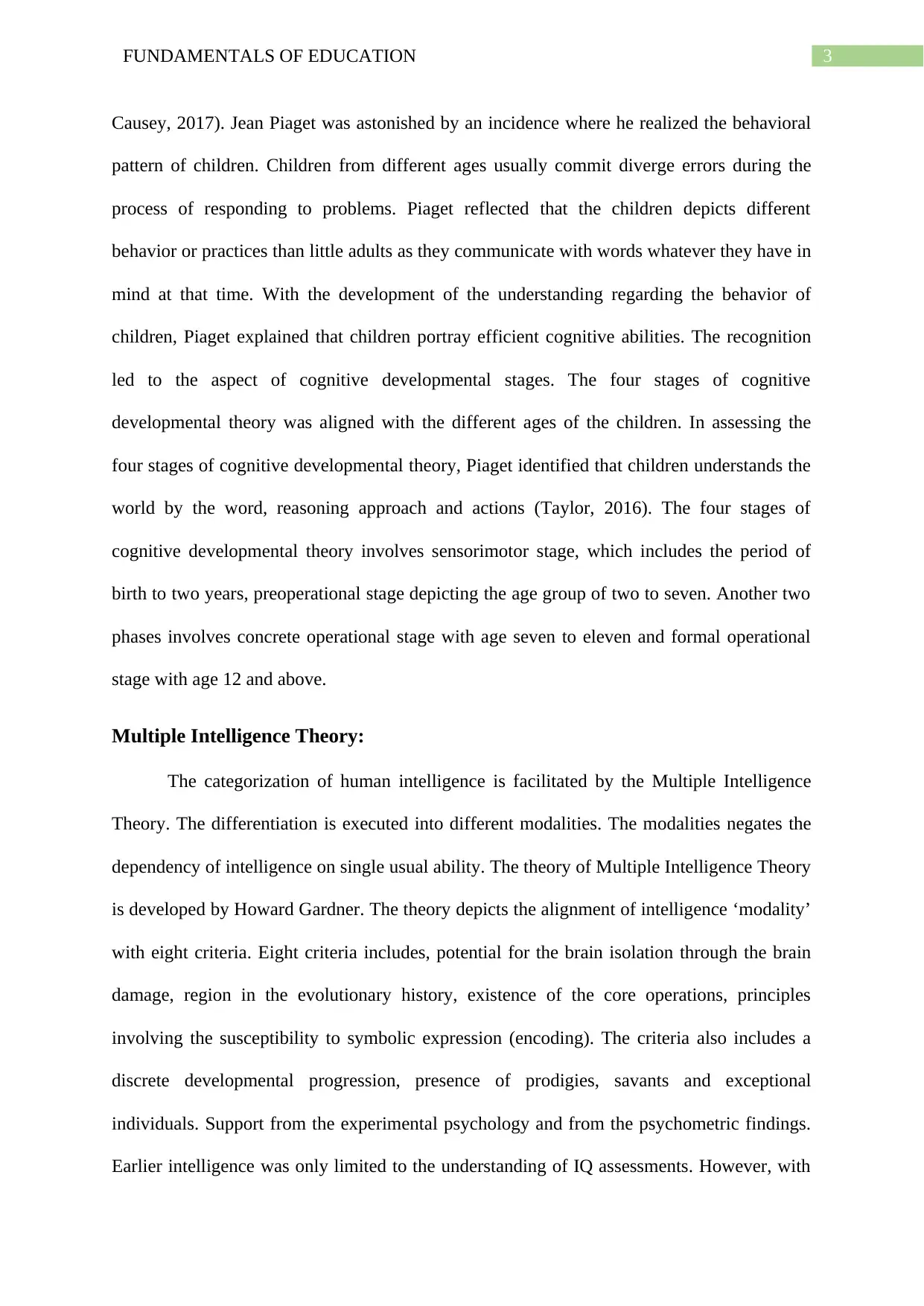
3FUNDAMENTALS OF EDUCATION
Causey, 2017). Jean Piaget was astonished by an incidence where he realized the behavioral
pattern of children. Children from different ages usually commit diverge errors during the
process of responding to problems. Piaget reflected that the children depicts different
behavior or practices than little adults as they communicate with words whatever they have in
mind at that time. With the development of the understanding regarding the behavior of
children, Piaget explained that children portray efficient cognitive abilities. The recognition
led to the aspect of cognitive developmental stages. The four stages of cognitive
developmental theory was aligned with the different ages of the children. In assessing the
four stages of cognitive developmental theory, Piaget identified that children understands the
world by the word, reasoning approach and actions (Taylor, 2016). The four stages of
cognitive developmental theory involves sensorimotor stage, which includes the period of
birth to two years, preoperational stage depicting the age group of two to seven. Another two
phases involves concrete operational stage with age seven to eleven and formal operational
stage with age 12 and above.
Multiple Intelligence Theory:
The categorization of human intelligence is facilitated by the Multiple Intelligence
Theory. The differentiation is executed into different modalities. The modalities negates the
dependency of intelligence on single usual ability. The theory of Multiple Intelligence Theory
is developed by Howard Gardner. The theory depicts the alignment of intelligence ‘modality’
with eight criteria. Eight criteria includes, potential for the brain isolation through the brain
damage, region in the evolutionary history, existence of the core operations, principles
involving the susceptibility to symbolic expression (encoding). The criteria also includes a
discrete developmental progression, presence of prodigies, savants and exceptional
individuals. Support from the experimental psychology and from the psychometric findings.
Earlier intelligence was only limited to the understanding of IQ assessments. However, with
Causey, 2017). Jean Piaget was astonished by an incidence where he realized the behavioral
pattern of children. Children from different ages usually commit diverge errors during the
process of responding to problems. Piaget reflected that the children depicts different
behavior or practices than little adults as they communicate with words whatever they have in
mind at that time. With the development of the understanding regarding the behavior of
children, Piaget explained that children portray efficient cognitive abilities. The recognition
led to the aspect of cognitive developmental stages. The four stages of cognitive
developmental theory was aligned with the different ages of the children. In assessing the
four stages of cognitive developmental theory, Piaget identified that children understands the
world by the word, reasoning approach and actions (Taylor, 2016). The four stages of
cognitive developmental theory involves sensorimotor stage, which includes the period of
birth to two years, preoperational stage depicting the age group of two to seven. Another two
phases involves concrete operational stage with age seven to eleven and formal operational
stage with age 12 and above.
Multiple Intelligence Theory:
The categorization of human intelligence is facilitated by the Multiple Intelligence
Theory. The differentiation is executed into different modalities. The modalities negates the
dependency of intelligence on single usual ability. The theory of Multiple Intelligence Theory
is developed by Howard Gardner. The theory depicts the alignment of intelligence ‘modality’
with eight criteria. Eight criteria includes, potential for the brain isolation through the brain
damage, region in the evolutionary history, existence of the core operations, principles
involving the susceptibility to symbolic expression (encoding). The criteria also includes a
discrete developmental progression, presence of prodigies, savants and exceptional
individuals. Support from the experimental psychology and from the psychometric findings.
Earlier intelligence was only limited to the understanding of IQ assessments. However, with
Paraphrase This Document
Need a fresh take? Get an instant paraphrase of this document with our AI Paraphraser
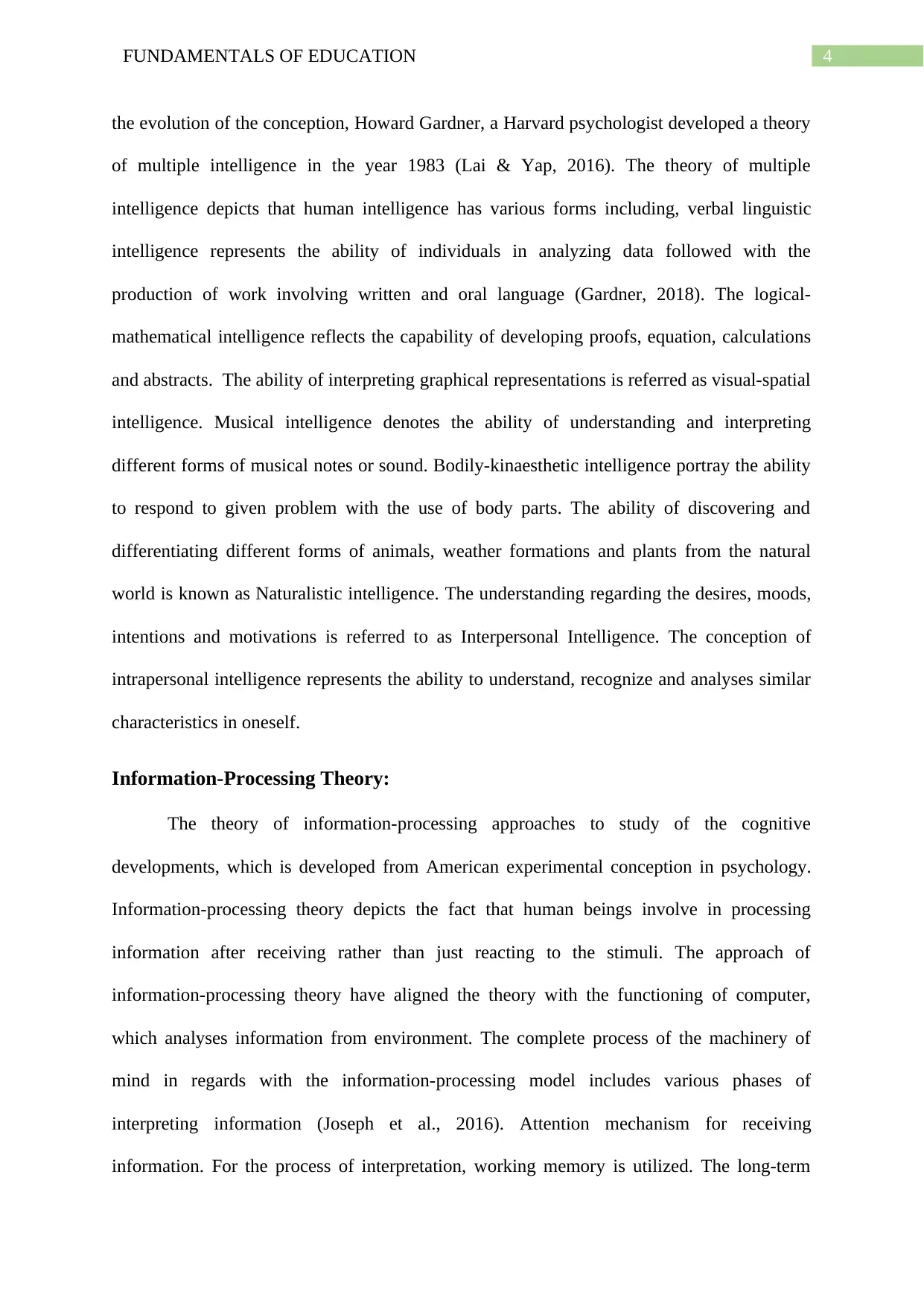
4FUNDAMENTALS OF EDUCATION
the evolution of the conception, Howard Gardner, a Harvard psychologist developed a theory
of multiple intelligence in the year 1983 (Lai & Yap, 2016). The theory of multiple
intelligence depicts that human intelligence has various forms including, verbal linguistic
intelligence represents the ability of individuals in analyzing data followed with the
production of work involving written and oral language (Gardner, 2018). The logical-
mathematical intelligence reflects the capability of developing proofs, equation, calculations
and abstracts. The ability of interpreting graphical representations is referred as visual-spatial
intelligence. Musical intelligence denotes the ability of understanding and interpreting
different forms of musical notes or sound. Bodily-kinaesthetic intelligence portray the ability
to respond to given problem with the use of body parts. The ability of discovering and
differentiating different forms of animals, weather formations and plants from the natural
world is known as Naturalistic intelligence. The understanding regarding the desires, moods,
intentions and motivations is referred to as Interpersonal Intelligence. The conception of
intrapersonal intelligence represents the ability to understand, recognize and analyses similar
characteristics in oneself.
Information-Processing Theory:
The theory of information-processing approaches to study of the cognitive
developments, which is developed from American experimental conception in psychology.
Information-processing theory depicts the fact that human beings involve in processing
information after receiving rather than just reacting to the stimuli. The approach of
information-processing theory have aligned the theory with the functioning of computer,
which analyses information from environment. The complete process of the machinery of
mind in regards with the information-processing model includes various phases of
interpreting information (Joseph et al., 2016). Attention mechanism for receiving
information. For the process of interpretation, working memory is utilized. The long-term
the evolution of the conception, Howard Gardner, a Harvard psychologist developed a theory
of multiple intelligence in the year 1983 (Lai & Yap, 2016). The theory of multiple
intelligence depicts that human intelligence has various forms including, verbal linguistic
intelligence represents the ability of individuals in analyzing data followed with the
production of work involving written and oral language (Gardner, 2018). The logical-
mathematical intelligence reflects the capability of developing proofs, equation, calculations
and abstracts. The ability of interpreting graphical representations is referred as visual-spatial
intelligence. Musical intelligence denotes the ability of understanding and interpreting
different forms of musical notes or sound. Bodily-kinaesthetic intelligence portray the ability
to respond to given problem with the use of body parts. The ability of discovering and
differentiating different forms of animals, weather formations and plants from the natural
world is known as Naturalistic intelligence. The understanding regarding the desires, moods,
intentions and motivations is referred to as Interpersonal Intelligence. The conception of
intrapersonal intelligence represents the ability to understand, recognize and analyses similar
characteristics in oneself.
Information-Processing Theory:
The theory of information-processing approaches to study of the cognitive
developments, which is developed from American experimental conception in psychology.
Information-processing theory depicts the fact that human beings involve in processing
information after receiving rather than just reacting to the stimuli. The approach of
information-processing theory have aligned the theory with the functioning of computer,
which analyses information from environment. The complete process of the machinery of
mind in regards with the information-processing model includes various phases of
interpreting information (Joseph et al., 2016). Attention mechanism for receiving
information. For the process of interpretation, working memory is utilized. The long-term
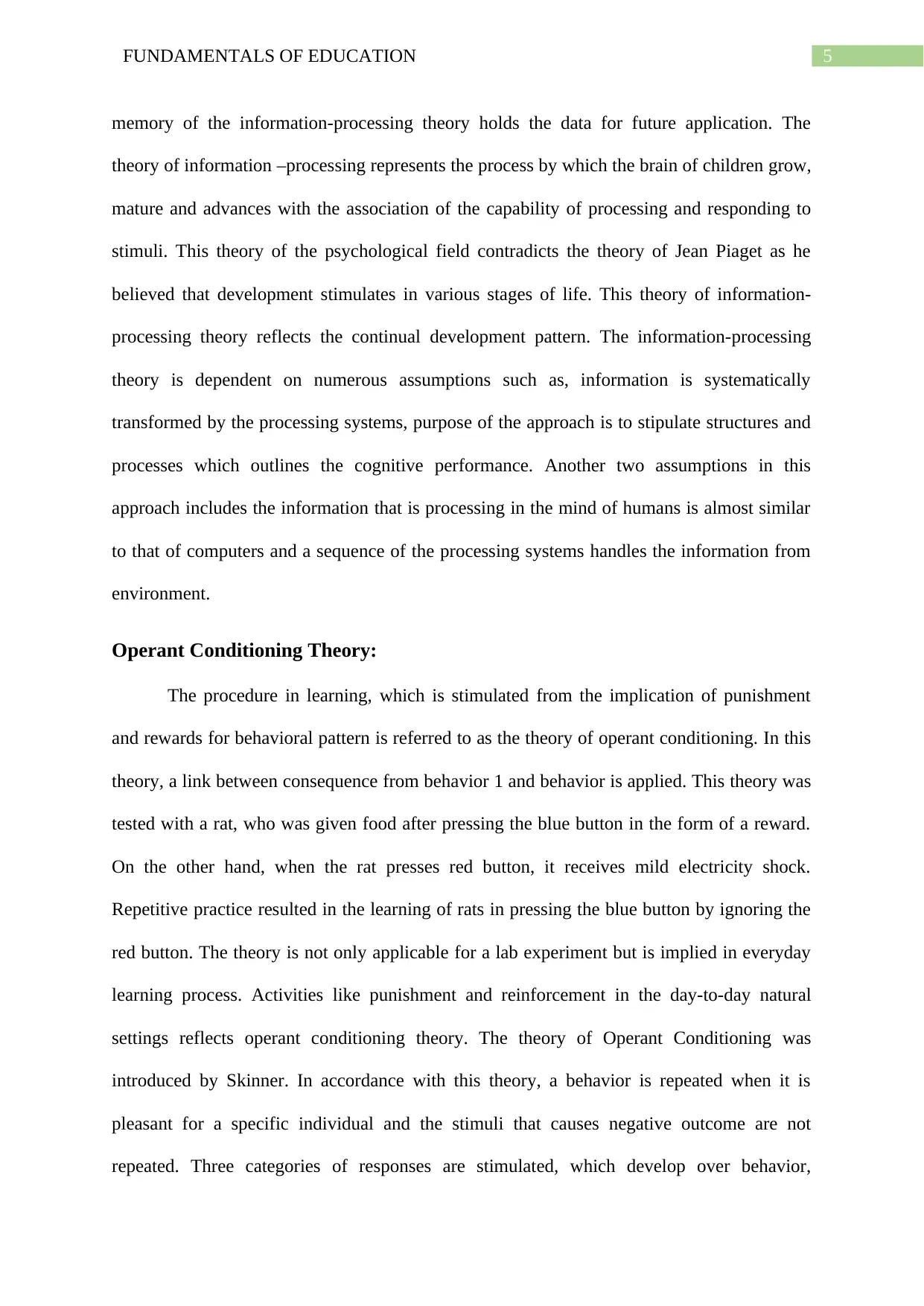
5FUNDAMENTALS OF EDUCATION
memory of the information-processing theory holds the data for future application. The
theory of information –processing represents the process by which the brain of children grow,
mature and advances with the association of the capability of processing and responding to
stimuli. This theory of the psychological field contradicts the theory of Jean Piaget as he
believed that development stimulates in various stages of life. This theory of information-
processing theory reflects the continual development pattern. The information-processing
theory is dependent on numerous assumptions such as, information is systematically
transformed by the processing systems, purpose of the approach is to stipulate structures and
processes which outlines the cognitive performance. Another two assumptions in this
approach includes the information that is processing in the mind of humans is almost similar
to that of computers and a sequence of the processing systems handles the information from
environment.
Operant Conditioning Theory:
The procedure in learning, which is stimulated from the implication of punishment
and rewards for behavioral pattern is referred to as the theory of operant conditioning. In this
theory, a link between consequence from behavior 1 and behavior is applied. This theory was
tested with a rat, who was given food after pressing the blue button in the form of a reward.
On the other hand, when the rat presses red button, it receives mild electricity shock.
Repetitive practice resulted in the learning of rats in pressing the blue button by ignoring the
red button. The theory is not only applicable for a lab experiment but is implied in everyday
learning process. Activities like punishment and reinforcement in the day-to-day natural
settings reflects operant conditioning theory. The theory of Operant Conditioning was
introduced by Skinner. In accordance with this theory, a behavior is repeated when it is
pleasant for a specific individual and the stimuli that causes negative outcome are not
repeated. Three categories of responses are stimulated, which develop over behavior,
memory of the information-processing theory holds the data for future application. The
theory of information –processing represents the process by which the brain of children grow,
mature and advances with the association of the capability of processing and responding to
stimuli. This theory of the psychological field contradicts the theory of Jean Piaget as he
believed that development stimulates in various stages of life. This theory of information-
processing theory reflects the continual development pattern. The information-processing
theory is dependent on numerous assumptions such as, information is systematically
transformed by the processing systems, purpose of the approach is to stipulate structures and
processes which outlines the cognitive performance. Another two assumptions in this
approach includes the information that is processing in the mind of humans is almost similar
to that of computers and a sequence of the processing systems handles the information from
environment.
Operant Conditioning Theory:
The procedure in learning, which is stimulated from the implication of punishment
and rewards for behavioral pattern is referred to as the theory of operant conditioning. In this
theory, a link between consequence from behavior 1 and behavior is applied. This theory was
tested with a rat, who was given food after pressing the blue button in the form of a reward.
On the other hand, when the rat presses red button, it receives mild electricity shock.
Repetitive practice resulted in the learning of rats in pressing the blue button by ignoring the
red button. The theory is not only applicable for a lab experiment but is implied in everyday
learning process. Activities like punishment and reinforcement in the day-to-day natural
settings reflects operant conditioning theory. The theory of Operant Conditioning was
introduced by Skinner. In accordance with this theory, a behavior is repeated when it is
pleasant for a specific individual and the stimuli that causes negative outcome are not
repeated. Three categories of responses are stimulated, which develop over behavior,
⊘ This is a preview!⊘
Do you want full access?
Subscribe today to unlock all pages.

Trusted by 1+ million students worldwide
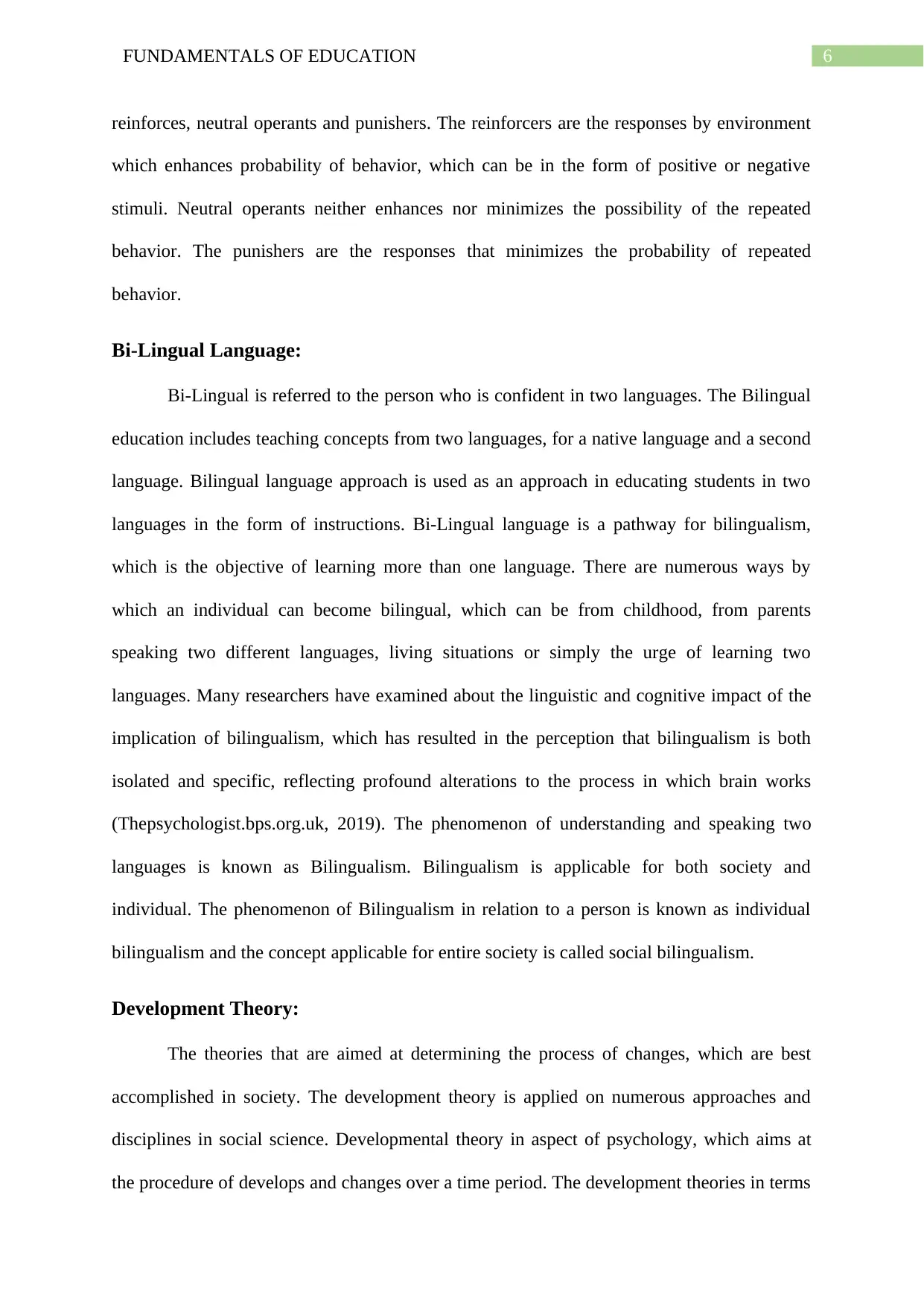
6FUNDAMENTALS OF EDUCATION
reinforces, neutral operants and punishers. The reinforcers are the responses by environment
which enhances probability of behavior, which can be in the form of positive or negative
stimuli. Neutral operants neither enhances nor minimizes the possibility of the repeated
behavior. The punishers are the responses that minimizes the probability of repeated
behavior.
Bi-Lingual Language:
Bi-Lingual is referred to the person who is confident in two languages. The Bilingual
education includes teaching concepts from two languages, for a native language and a second
language. Bilingual language approach is used as an approach in educating students in two
languages in the form of instructions. Bi-Lingual language is a pathway for bilingualism,
which is the objective of learning more than one language. There are numerous ways by
which an individual can become bilingual, which can be from childhood, from parents
speaking two different languages, living situations or simply the urge of learning two
languages. Many researchers have examined about the linguistic and cognitive impact of the
implication of bilingualism, which has resulted in the perception that bilingualism is both
isolated and specific, reflecting profound alterations to the process in which brain works
(Thepsychologist.bps.org.uk, 2019). The phenomenon of understanding and speaking two
languages is known as Bilingualism. Bilingualism is applicable for both society and
individual. The phenomenon of Bilingualism in relation to a person is known as individual
bilingualism and the concept applicable for entire society is called social bilingualism.
Development Theory:
The theories that are aimed at determining the process of changes, which are best
accomplished in society. The development theory is applied on numerous approaches and
disciplines in social science. Developmental theory in aspect of psychology, which aims at
the procedure of develops and changes over a time period. The development theories in terms
reinforces, neutral operants and punishers. The reinforcers are the responses by environment
which enhances probability of behavior, which can be in the form of positive or negative
stimuli. Neutral operants neither enhances nor minimizes the possibility of the repeated
behavior. The punishers are the responses that minimizes the probability of repeated
behavior.
Bi-Lingual Language:
Bi-Lingual is referred to the person who is confident in two languages. The Bilingual
education includes teaching concepts from two languages, for a native language and a second
language. Bilingual language approach is used as an approach in educating students in two
languages in the form of instructions. Bi-Lingual language is a pathway for bilingualism,
which is the objective of learning more than one language. There are numerous ways by
which an individual can become bilingual, which can be from childhood, from parents
speaking two different languages, living situations or simply the urge of learning two
languages. Many researchers have examined about the linguistic and cognitive impact of the
implication of bilingualism, which has resulted in the perception that bilingualism is both
isolated and specific, reflecting profound alterations to the process in which brain works
(Thepsychologist.bps.org.uk, 2019). The phenomenon of understanding and speaking two
languages is known as Bilingualism. Bilingualism is applicable for both society and
individual. The phenomenon of Bilingualism in relation to a person is known as individual
bilingualism and the concept applicable for entire society is called social bilingualism.
Development Theory:
The theories that are aimed at determining the process of changes, which are best
accomplished in society. The development theory is applied on numerous approaches and
disciplines in social science. Developmental theory in aspect of psychology, which aims at
the procedure of develops and changes over a time period. The development theories in terms
Paraphrase This Document
Need a fresh take? Get an instant paraphrase of this document with our AI Paraphraser
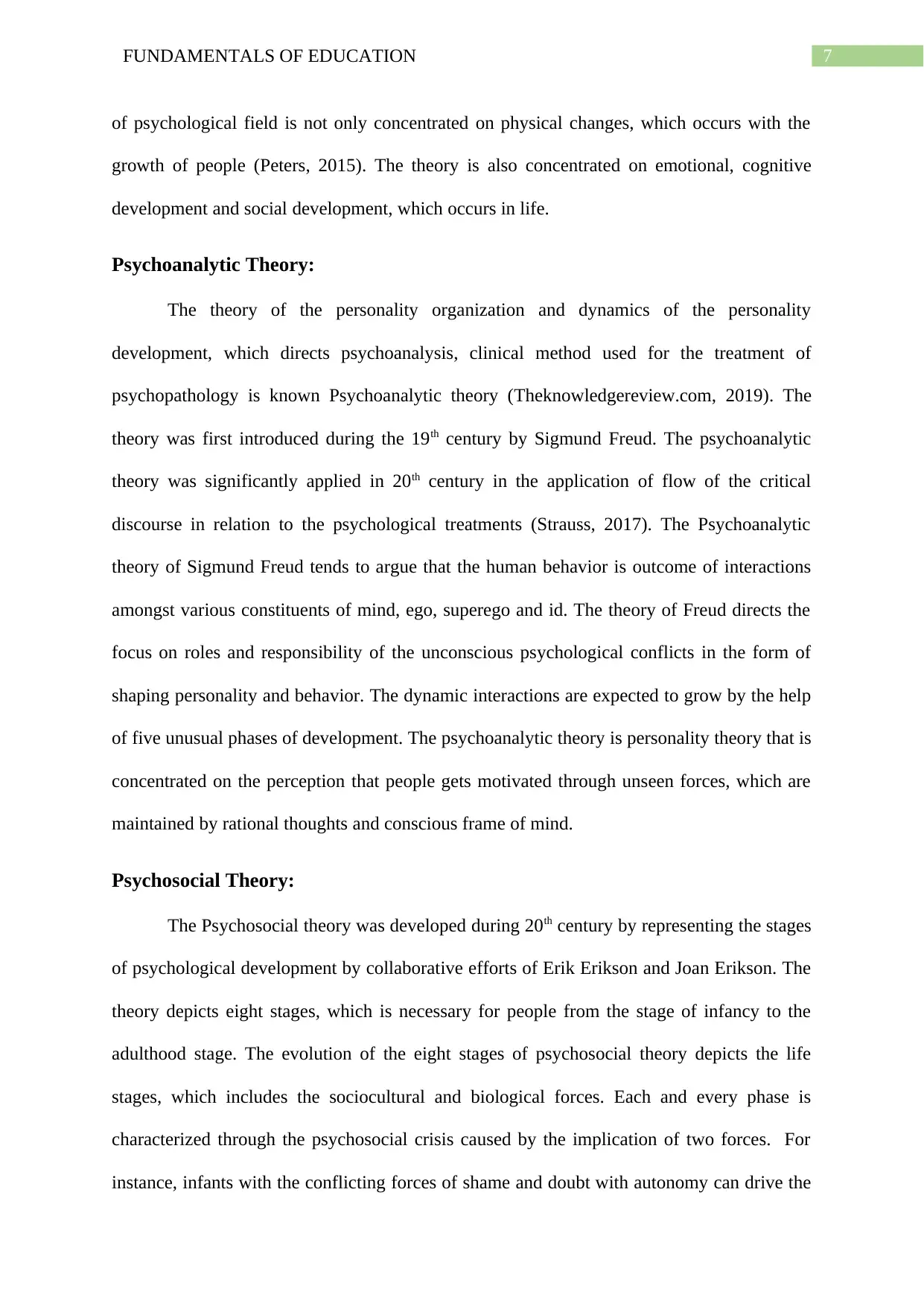
7FUNDAMENTALS OF EDUCATION
of psychological field is not only concentrated on physical changes, which occurs with the
growth of people (Peters, 2015). The theory is also concentrated on emotional, cognitive
development and social development, which occurs in life.
Psychoanalytic Theory:
The theory of the personality organization and dynamics of the personality
development, which directs psychoanalysis, clinical method used for the treatment of
psychopathology is known Psychoanalytic theory (Theknowledgereview.com, 2019). The
theory was first introduced during the 19th century by Sigmund Freud. The psychoanalytic
theory was significantly applied in 20th century in the application of flow of the critical
discourse in relation to the psychological treatments (Strauss, 2017). The Psychoanalytic
theory of Sigmund Freud tends to argue that the human behavior is outcome of interactions
amongst various constituents of mind, ego, superego and id. The theory of Freud directs the
focus on roles and responsibility of the unconscious psychological conflicts in the form of
shaping personality and behavior. The dynamic interactions are expected to grow by the help
of five unusual phases of development. The psychoanalytic theory is personality theory that is
concentrated on the perception that people gets motivated through unseen forces, which are
maintained by rational thoughts and conscious frame of mind.
Psychosocial Theory:
The Psychosocial theory was developed during 20th century by representing the stages
of psychological development by collaborative efforts of Erik Erikson and Joan Erikson. The
theory depicts eight stages, which is necessary for people from the stage of infancy to the
adulthood stage. The evolution of the eight stages of psychosocial theory depicts the life
stages, which includes the sociocultural and biological forces. Each and every phase is
characterized through the psychosocial crisis caused by the implication of two forces. For
instance, infants with the conflicting forces of shame and doubt with autonomy can drive the
of psychological field is not only concentrated on physical changes, which occurs with the
growth of people (Peters, 2015). The theory is also concentrated on emotional, cognitive
development and social development, which occurs in life.
Psychoanalytic Theory:
The theory of the personality organization and dynamics of the personality
development, which directs psychoanalysis, clinical method used for the treatment of
psychopathology is known Psychoanalytic theory (Theknowledgereview.com, 2019). The
theory was first introduced during the 19th century by Sigmund Freud. The psychoanalytic
theory was significantly applied in 20th century in the application of flow of the critical
discourse in relation to the psychological treatments (Strauss, 2017). The Psychoanalytic
theory of Sigmund Freud tends to argue that the human behavior is outcome of interactions
amongst various constituents of mind, ego, superego and id. The theory of Freud directs the
focus on roles and responsibility of the unconscious psychological conflicts in the form of
shaping personality and behavior. The dynamic interactions are expected to grow by the help
of five unusual phases of development. The psychoanalytic theory is personality theory that is
concentrated on the perception that people gets motivated through unseen forces, which are
maintained by rational thoughts and conscious frame of mind.
Psychosocial Theory:
The Psychosocial theory was developed during 20th century by representing the stages
of psychological development by collaborative efforts of Erik Erikson and Joan Erikson. The
theory depicts eight stages, which is necessary for people from the stage of infancy to the
adulthood stage. The evolution of the eight stages of psychosocial theory depicts the life
stages, which includes the sociocultural and biological forces. Each and every phase is
characterized through the psychosocial crisis caused by the implication of two forces. For
instance, infants with the conflicting forces of shame and doubt with autonomy can drive the
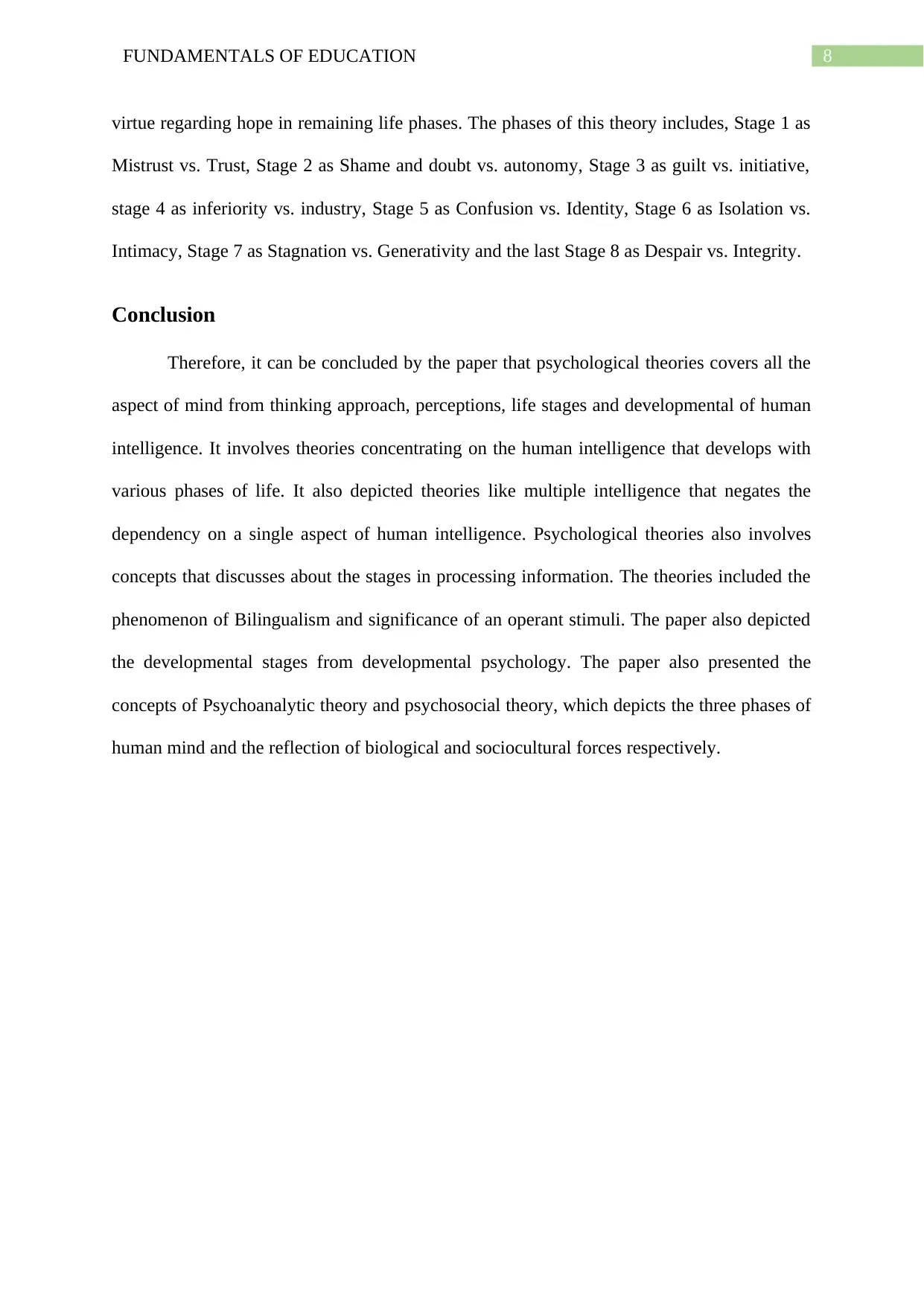
8FUNDAMENTALS OF EDUCATION
virtue regarding hope in remaining life phases. The phases of this theory includes, Stage 1 as
Mistrust vs. Trust, Stage 2 as Shame and doubt vs. autonomy, Stage 3 as guilt vs. initiative,
stage 4 as inferiority vs. industry, Stage 5 as Confusion vs. Identity, Stage 6 as Isolation vs.
Intimacy, Stage 7 as Stagnation vs. Generativity and the last Stage 8 as Despair vs. Integrity.
Conclusion
Therefore, it can be concluded by the paper that psychological theories covers all the
aspect of mind from thinking approach, perceptions, life stages and developmental of human
intelligence. It involves theories concentrating on the human intelligence that develops with
various phases of life. It also depicted theories like multiple intelligence that negates the
dependency on a single aspect of human intelligence. Psychological theories also involves
concepts that discusses about the stages in processing information. The theories included the
phenomenon of Bilingualism and significance of an operant stimuli. The paper also depicted
the developmental stages from developmental psychology. The paper also presented the
concepts of Psychoanalytic theory and psychosocial theory, which depicts the three phases of
human mind and the reflection of biological and sociocultural forces respectively.
virtue regarding hope in remaining life phases. The phases of this theory includes, Stage 1 as
Mistrust vs. Trust, Stage 2 as Shame and doubt vs. autonomy, Stage 3 as guilt vs. initiative,
stage 4 as inferiority vs. industry, Stage 5 as Confusion vs. Identity, Stage 6 as Isolation vs.
Intimacy, Stage 7 as Stagnation vs. Generativity and the last Stage 8 as Despair vs. Integrity.
Conclusion
Therefore, it can be concluded by the paper that psychological theories covers all the
aspect of mind from thinking approach, perceptions, life stages and developmental of human
intelligence. It involves theories concentrating on the human intelligence that develops with
various phases of life. It also depicted theories like multiple intelligence that negates the
dependency on a single aspect of human intelligence. Psychological theories also involves
concepts that discusses about the stages in processing information. The theories included the
phenomenon of Bilingualism and significance of an operant stimuli. The paper also depicted
the developmental stages from developmental psychology. The paper also presented the
concepts of Psychoanalytic theory and psychosocial theory, which depicts the three phases of
human mind and the reflection of biological and sociocultural forces respectively.
⊘ This is a preview!⊘
Do you want full access?
Subscribe today to unlock all pages.

Trusted by 1+ million students worldwide
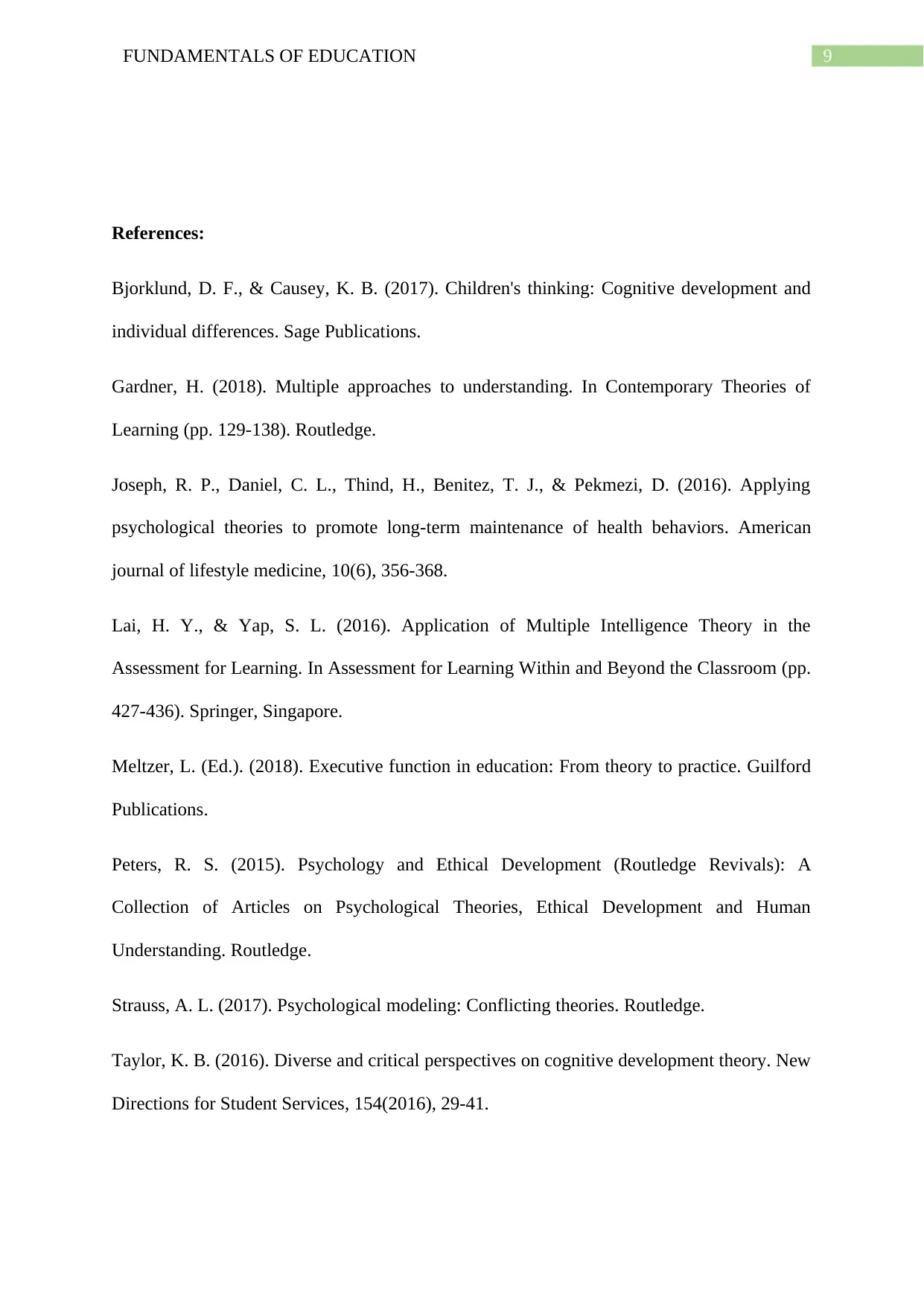
9FUNDAMENTALS OF EDUCATION
References:
Bjorklund, D. F., & Causey, K. B. (2017). Children's thinking: Cognitive development and
individual differences. Sage Publications.
Gardner, H. (2018). Multiple approaches to understanding. In Contemporary Theories of
Learning (pp. 129-138). Routledge.
Joseph, R. P., Daniel, C. L., Thind, H., Benitez, T. J., & Pekmezi, D. (2016). Applying
psychological theories to promote long-term maintenance of health behaviors. American
journal of lifestyle medicine, 10(6), 356-368.
Lai, H. Y., & Yap, S. L. (2016). Application of Multiple Intelligence Theory in the
Assessment for Learning. In Assessment for Learning Within and Beyond the Classroom (pp.
427-436). Springer, Singapore.
Meltzer, L. (Ed.). (2018). Executive function in education: From theory to practice. Guilford
Publications.
Peters, R. S. (2015). Psychology and Ethical Development (Routledge Revivals): A
Collection of Articles on Psychological Theories, Ethical Development and Human
Understanding. Routledge.
Strauss, A. L. (2017). Psychological modeling: Conflicting theories. Routledge.
Taylor, K. B. (2016). Diverse and critical perspectives on cognitive development theory. New
Directions for Student Services, 154(2016), 29-41.
References:
Bjorklund, D. F., & Causey, K. B. (2017). Children's thinking: Cognitive development and
individual differences. Sage Publications.
Gardner, H. (2018). Multiple approaches to understanding. In Contemporary Theories of
Learning (pp. 129-138). Routledge.
Joseph, R. P., Daniel, C. L., Thind, H., Benitez, T. J., & Pekmezi, D. (2016). Applying
psychological theories to promote long-term maintenance of health behaviors. American
journal of lifestyle medicine, 10(6), 356-368.
Lai, H. Y., & Yap, S. L. (2016). Application of Multiple Intelligence Theory in the
Assessment for Learning. In Assessment for Learning Within and Beyond the Classroom (pp.
427-436). Springer, Singapore.
Meltzer, L. (Ed.). (2018). Executive function in education: From theory to practice. Guilford
Publications.
Peters, R. S. (2015). Psychology and Ethical Development (Routledge Revivals): A
Collection of Articles on Psychological Theories, Ethical Development and Human
Understanding. Routledge.
Strauss, A. L. (2017). Psychological modeling: Conflicting theories. Routledge.
Taylor, K. B. (2016). Diverse and critical perspectives on cognitive development theory. New
Directions for Student Services, 154(2016), 29-41.
Paraphrase This Document
Need a fresh take? Get an instant paraphrase of this document with our AI Paraphraser
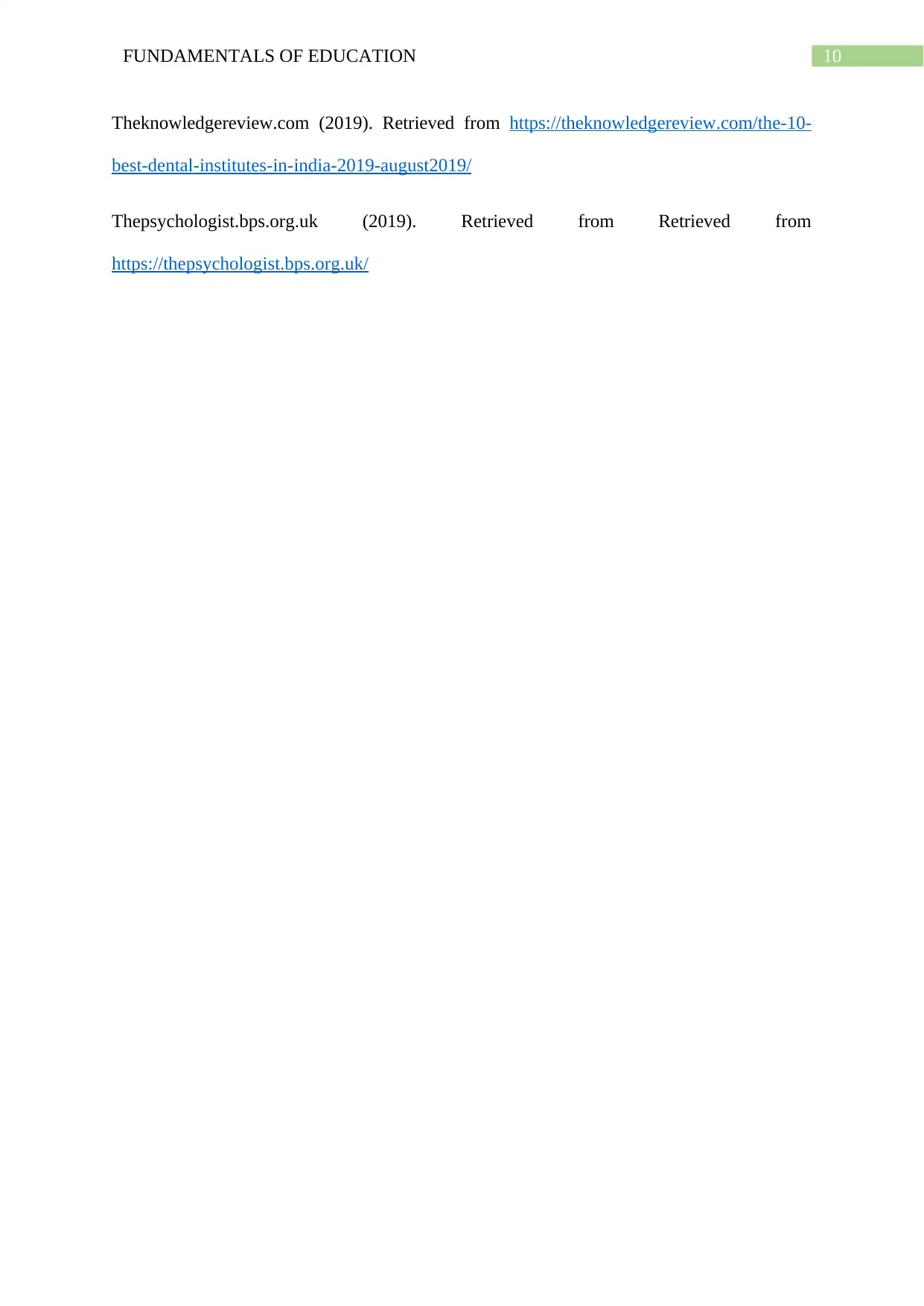
10FUNDAMENTALS OF EDUCATION
Theknowledgereview.com (2019). Retrieved from https://theknowledgereview.com/the-10-
best-dental-institutes-in-india-2019-august2019/
Thepsychologist.bps.org.uk (2019). Retrieved from Retrieved from
https://thepsychologist.bps.org.uk/
Theknowledgereview.com (2019). Retrieved from https://theknowledgereview.com/the-10-
best-dental-institutes-in-india-2019-august2019/
Thepsychologist.bps.org.uk (2019). Retrieved from Retrieved from
https://thepsychologist.bps.org.uk/
1 out of 11
Related Documents
Your All-in-One AI-Powered Toolkit for Academic Success.
+13062052269
info@desklib.com
Available 24*7 on WhatsApp / Email
![[object Object]](/_next/static/media/star-bottom.7253800d.svg)
Unlock your academic potential
© 2024 | Zucol Services PVT LTD | All rights reserved.





